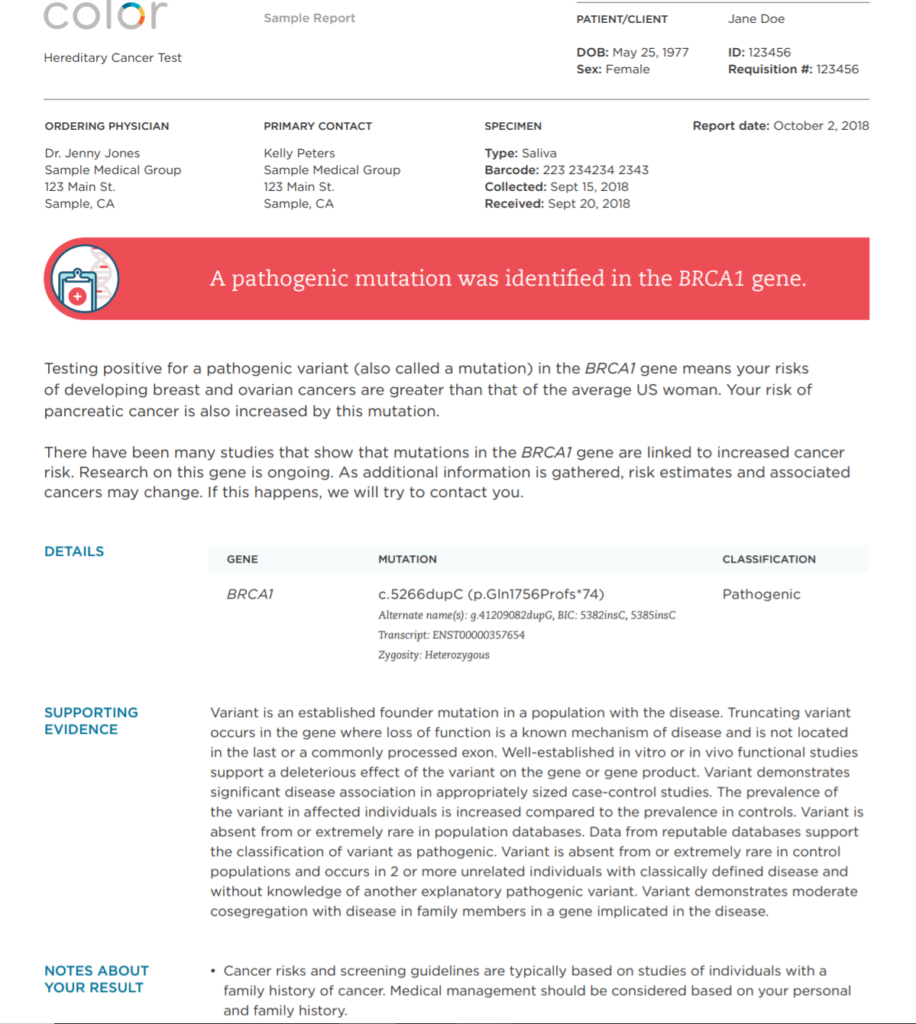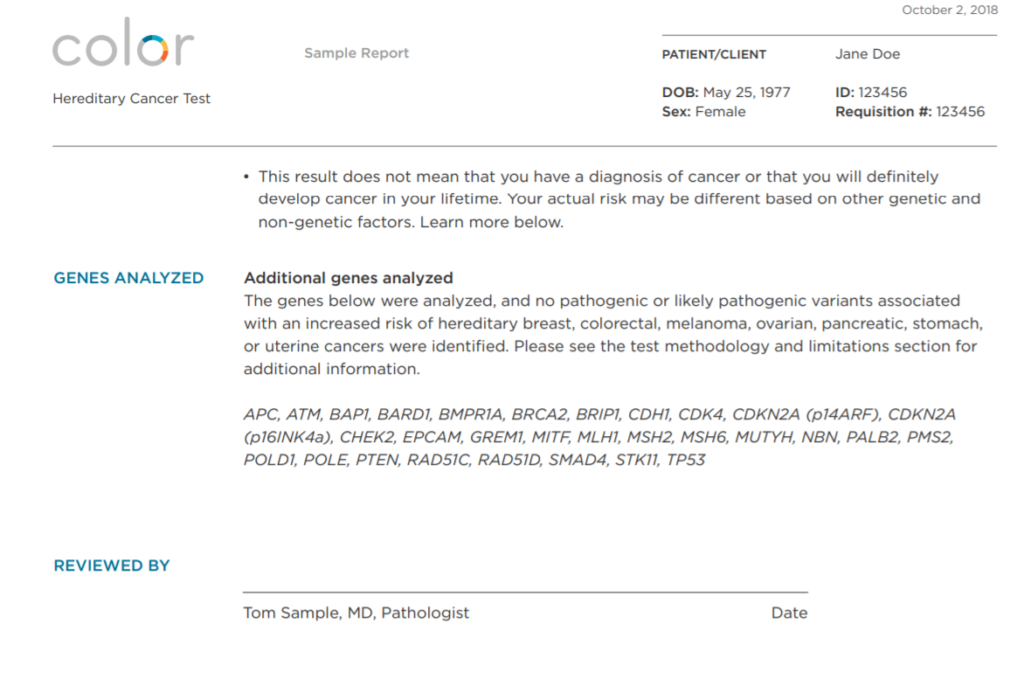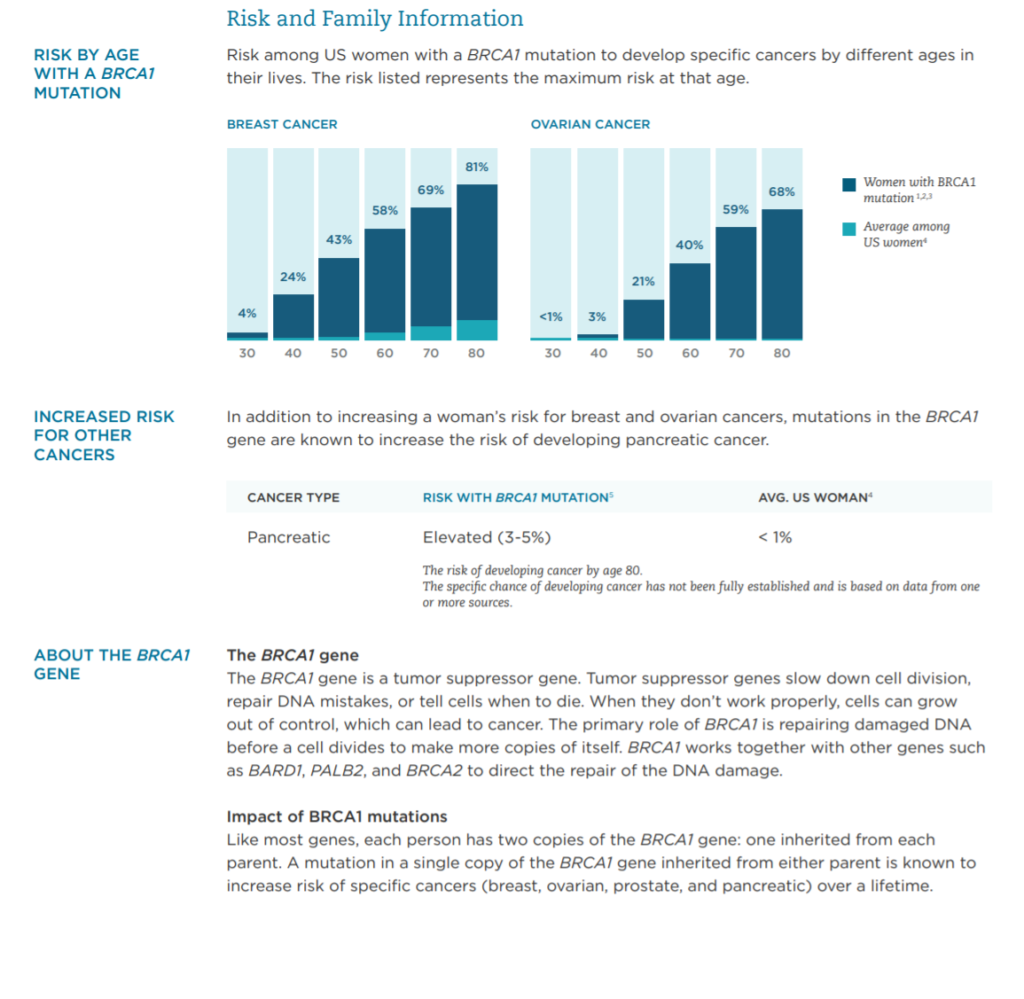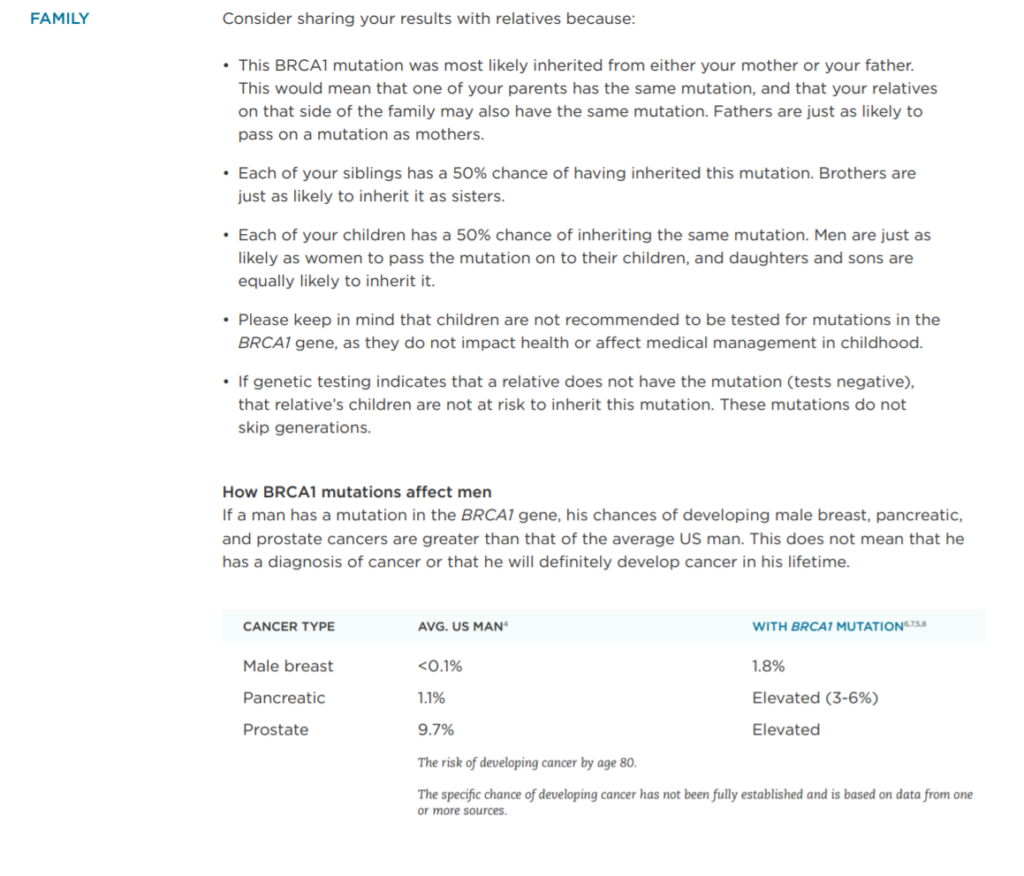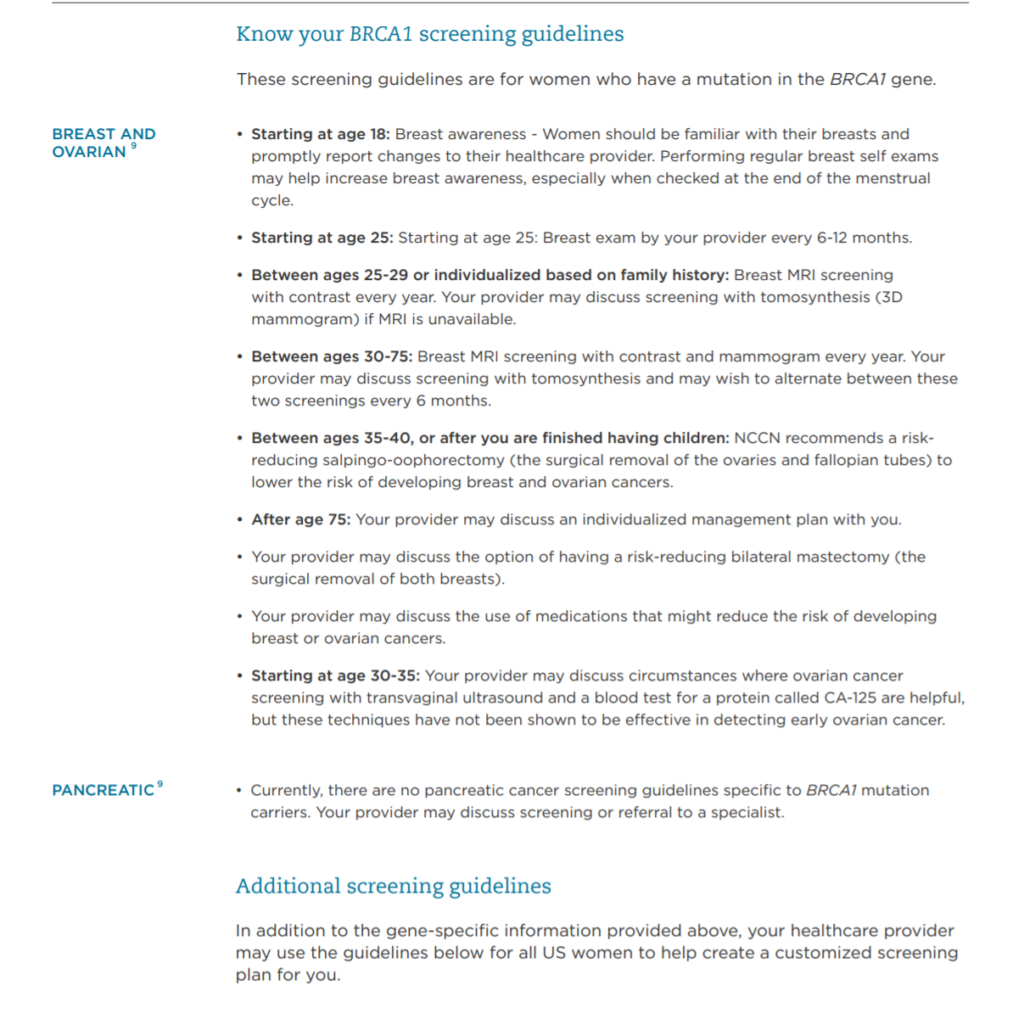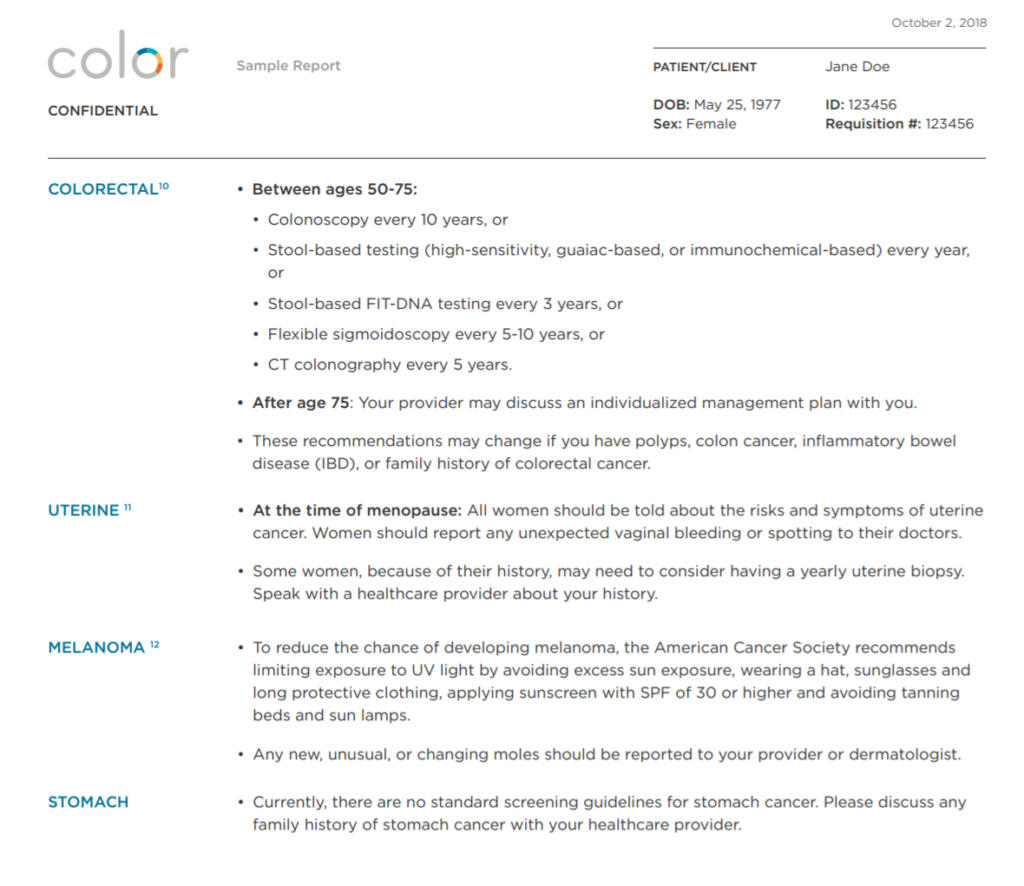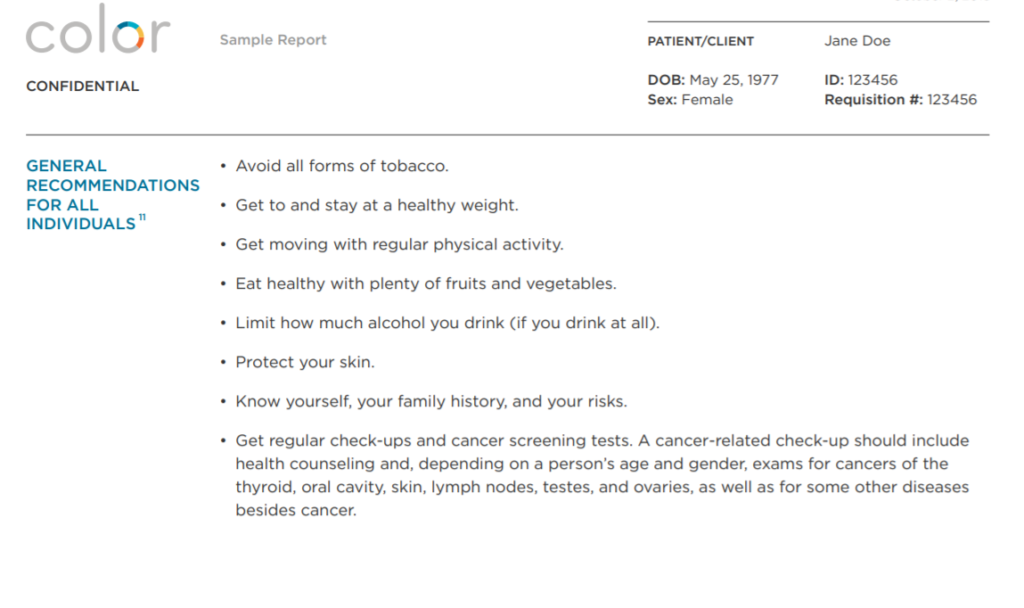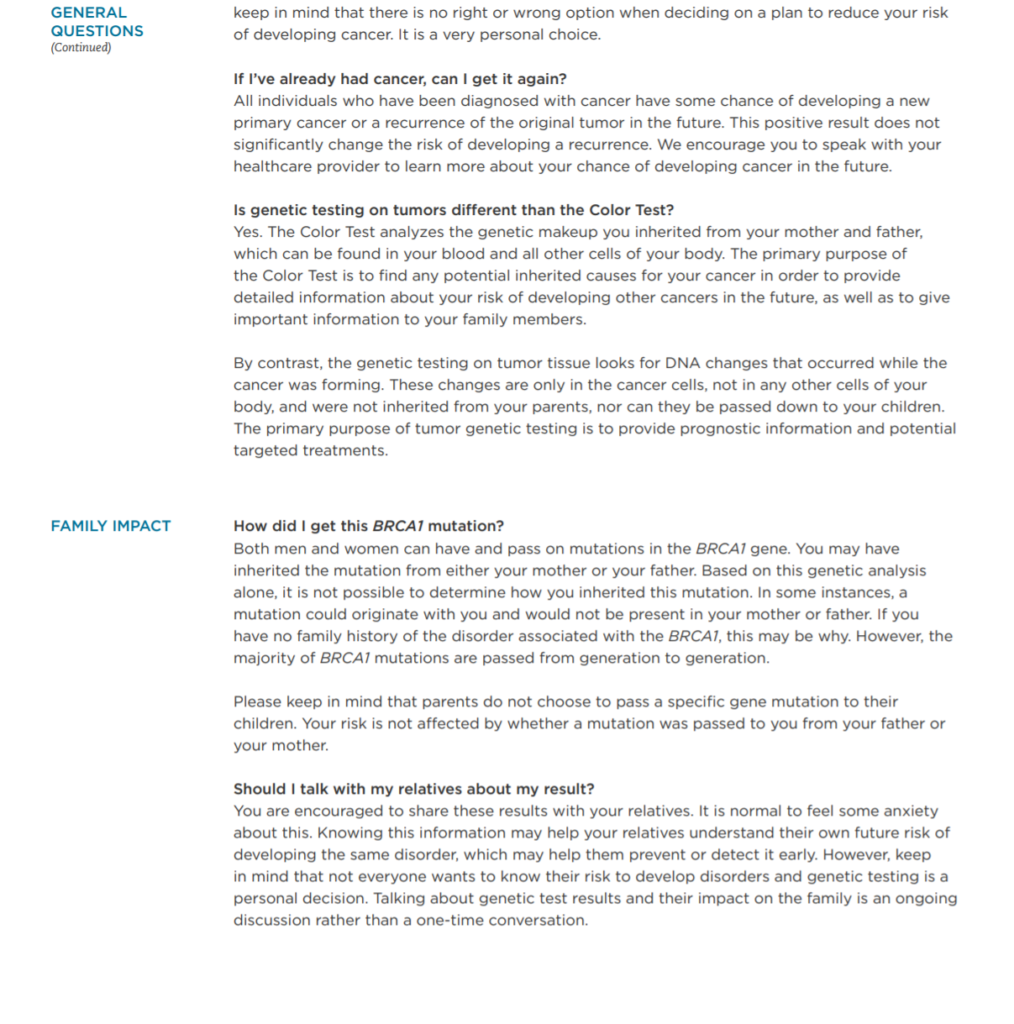
Overview
- Products: Color Genomics creates genetic tests for use by individuals both in cooperation with their primary doctor or an independent physician. Their tests assess psychotropic, cancer, and cardiology related genetic predispositions and they also provide options for broader genetic health assessments that refer to all three areas of interest.
- Cost: Color’s hereditary cancer, cardiology, and extended health analyses cost $249 each, however, if the tests are ordered by a physician for use by one of their patients, the cost of testing may be covered by insurance or healthcare providers.
- Reports: Color’s reports for its full range of tests are extensively detailed. The reports include explanations of the mutation in question, the clinical and health implications of such an expression, familial and broad population comparisons, and methodological processes.
- Raw Data Access: For most of their tests Color does not allow clients to download their individual genetic data. The exception to this is special requests made with respect to Color’s whole genome sequencing. Color does not accept DNA files from other companies with which a client may have already had their DNA tested.
- Privacy: Color does collect a certain amount of their clients’ private data including personal, medical history, and lifestyle information. De-identified client data is shared with public health databases for research purposes and identifiable client information is sometimes shared with third-party vendors, external contractors, and other companies.
- Alternatives: SelfDecode (comprehensive, detail-oriented genetic reports and wellness recommendations, for both individuals and professionals), Ambry Genetics (topically specified genetic testing for individual use in conjunction with their physician).
Pros
- Color provides a wide range of services that are meant to be as accessible as possible. Their tests can be used to identify hereditary diseases, cancerous predispositions, cardiological status, and for psychotropic assessment which offers information about how one might respond to certain medications.
- Color has a variety of very formal, clinical applications as well as more lighthearted, recreational functions such as the ‘Discovery’ operation. They can provide you with information that is as serious as indicating a possible risk for certain types of cancer, or as trivial as whether you have a proclivity to like or dislike cilantro.
- One of Color’s primary goals is to offer genetic testing which assists practitioners in making educated and informed decisions about treatment. To make this opportunity viable for as many people as possible, they offer the potential for reduced testing costs depending on the type of insurance coverage a patient may have.
Cons
- Color doesn’t allow its users to upload genetic data files they may have already acquired from other companies; their testing process and kits are sold together as a singular package. This means clients with existing access to their genetic information will still have to pay to get it re-analyzed.
- All of Color’s test kits need to be ordered by a physician, they can’t be ordered by an individual privately. While Color provides a mechanism through which a user can have their case file sent to an independent physician and a test-kit ordered, this extends the turnaround time for their genetic analyses.
- While extremely detailed, portions of the Color test reports can be dense and difficult to understand without the help of a physician or genetic counselor. While Color does give the option for users to communicate with a genetic counselor upon receiving their results, it means that clients have little agency absent the support of an external source.
- The few recommendations that Color’s test reports make, absent the advice of a genetic counselor, are exceedingly general.
About Color Genomics
Color Genomics was co-founded in 2015 by Elad Gil, Nish Bhat, and current CEO and Stanford graduate, Othman Laraki. In addition to their genetic testing services, Color has branched out into the field of population health over the last 5 years. They partner with other healthcare companies and aid providers to administer strategy, planning, implementation, and participant engagement in larger health systems.
In general, Color is seeking to make genetic testing more widely available both at an expansive, macro-level and for individuals at the micro-level. Laraki is also personally passionate about the potential for the advancement of technology to restructure how healthcare operates on a global scale.
Overview of Color Genomics Testing
The Color testing process has little variation regardless of the type of test that has been requested. Color provides tests in two categories: Their ‘standard’ selection of tests which includes a psychotropic medication response test, a hereditary high cholesterol test, and a test that analyzes common causes of breast and ovarian cancer, and Color’s ‘extended’ test, which assesses a more inclusive set of genetic data that combines analyses of genotypes related to medication response, cardiological health, and hereditary cancers.
The extended test which Color provides is available both to individuals who order in conjunction with their primary physician and those who do so with an independent doctor. If a user orders a test without the consultation of their primary healthcare provider, their case file will be sent to an independent physician who then orders the test.
All of the tests are adequate, though not extensively investigative, with Color’s cardiological health test analyzing 10 genes of significance, their hereditary cancer test identifying 30, and their extended test overviewing 74 genes linked to hereditary disease.
Finally, in 2018 Color introduced a new program which they call ‘low-coverage whole genome sequencing.’ This type of testing is Color’s solution for a more affordable and ethnically sensitive version of whole genome sequencing which samples the entire genotype at a low depth. Color claims that this technique achieves a similar technical accuracy as normal genotyping while being more inclusive to individuals of non-European descent who wish to have their genome sequenced.
Review of Color Genomics Test Reports
The reports that Color provides include a significant amount of detail about the mutation under consideration. They begin by displaying, in a large bolded section, whether a mutation was found for the particular gene being analyzed. The area appears red if a mutation has been identified and green if one has not been.
Below the marker, a general description of the mutation is given as well as an overview of the typical health consequences and implications for such an expression. Finally, supporting evidence, miscellaneous notes, and a list of related but insignificantly expressed genes are provided. Below, a sample report can be observed for a female with a positive mutation BRCA1 gene which can indicate an increased risk of developing breast or ovarian cancer.
The next pages of the report are focused on general risk and familial information. They show larger comparative risks for either cardiological disease, cancer, or other afflictions depending on the type of test. The display shows the primary illnesses which are higher risk factors because of the mutation, as well as less drastic though still statistically significant diseases.
Finally, there is an overview of the gene mutation itself, with a short description of the gene’s general biological role, followed by a section that describes the accumulated risks for one’s family based on the hereditary patterns of gene transmission. These pages can be viewed below.
The pages following offer general screening guidelines for diseases associated with the particular mutation, in this case breast and ovarian cancer. The report also provides fairly routine screening recommendations for other, less prevalent risk factors associated with the mutation.
These guidelines are meant to assist the client and their clinician in creating a screening plan which is effective and specific to the patient, however, they do not make any actionable recommendations with which the patient can take independent precautions. The pages are pictured below.
Subsequently, there is a small section which includes very general recommendations that are relevant to all individuals. It is unclear if these recommendations are meant to apply to those with the mutation evidenced by the report, or if they are merely broad health recommendations to reduce the risk of cancer regardless of biological predisposition.
The final pages of the report are occupied by a laundry list of relevant queries, FAQ’s, and colloquial information which contextualize the results that are outlined above. Many of the questions clarify risk factors that may have been initially unclear or outline a set of expectations it might be reasonable to adopt based on the results of the report. There are also a specific set of questions that address the discussion of the results with family members. A portion of the page is shown below.
The final inclusion in the reports is a longer section dedicated to the methodologies used by Color to perform their analysis, as well as a set of caveats that reflect the limitations of their testing. The final page displays a toll-free number which can be contacted if users have any questions about their results. It also includes the citations to relevant scientific literature which is relied on in the test report.
In their totality, these test reports do offer a meaningful amount of information to Color’s clients, and on their face, they also seem to provide a nominal number of recommendations and suggestions about how to address the implications of the test results.
However, it should be noted that all of the recommendations provided are of a decidedly generic nature, and should users wish to get more impactful, actionable advice, they need to schedule a separate session with a genetic counselor or review the results with their general practitioner. In addition, the range of topics covered by Color’s reports is somewhat limited; except for the ‘extended test,’ the reports are strictly constrained to cardiological and hereditary cancer assessments.
Color Genomics Cost
The cost of Color’s tests, at $249, is in the upper-mid range as far as most major genetics testing prices are concerned. Additionally, a portion of the patient’s incurred costs will likely be covered by their health insurance if their primary physician has ordered the test.
One disadvantage of the Color test costs is that they do not allow users to upload existing DNA files from other companies. A Color specific saliva test-kit is required in order to receive reports. This means that there is no cost reduction for users that already have access to their raw genetic data. The extended test, which covers 74 genotypes in patients and spans areas of psychotropics, cardiovascular health, and hereditary cancer is evidently the best value for patients who end up paying the full test cost.
Is Color Genomics’ ‘low-coverage whole genome sequencing’ effective?
Color’s ‘low-coverage’ whole genome sequencing is a unique service introduced in 2018. Whole-genome sequencing involves examining almost every single gene within a person’s genome. Normally, whole genome sequencing is far more expensive, so a question arises concerning how much meaningful information is being gleaned by users for a far higher price than most less intensive tests cost.
However, Color’s ‘low-coverage’ sequencing is intended as a remedy for the normally steep price-point that is associated with whole genome sequencing. They also claim that sequencing the entire genome at a low coverage overcomes ethnic disparities which can affect the accuracy of more standard microarray sequencing. Many statistical applications of genetics are only presently applicable to European or caucasian populations.
Color attests that they can provide their low-coverage whole genome sequencing for comparable costs to existing, more standard genetic testing programs. At this time, Color has put their low-coverage sequencing into practice for the majority of their genetic tests, however, to access the raw genetic data from these tests, clients must reach out separately to Color’s counseling board by email.
Color Genomics Health Recommendations
As noted in the reports, Color does make a variety of health recommendations within the actual pages of the gene analysis that users receive. However, about half of these suggestions are merely guidelines about what kinds of screening processes are generally applicable with respect to either the cardiological or cancer risks assumed based on the users’ genetic makeup. The other recommendations which Color makes are exceedingly general, including advice such as “Get to and stay at a healthy weight,” or “Avoid all forms of tobacco.”
The report recommendations that Color makes which are actually specific to their clients’ genetic information are sparse to non-existent. Part of the process which Color intends is that upon receiving test-results, users should either communicate with a genetic counselor, a service which is possible to access through Color’s website, or communicate with their general practitioner to create a pragmatic plan for addressing the results of their test.
However, both of these actions require clients to spend additional time scheduling and waiting, and the lack of actionable information that Color provides in reports doesn’t offer any individual agency to users who might hope to take addressing health risks into their own hands.
Color Genomics Privacy and Security
Color does engage in the collection of both what they call Personally Identifiable Information as well as Personal Health Information. Clients have to agree to the terms of Color’s privacy policy before utilizing the service. Once they do, Color uses this information to revise and improve the services they provide to customers, as well as shares this information in a limited capacity with third-party collaborators who provide development, analytic, payment processing, hosting, and maintenance services to their company.
In addition to this data collection, Color also shares customers’ de-identified genetic data (information which can reasonably be said to be untraceable back to the individual it belongs to) with public databases for research purposes. They hold that this is beneficial for advancing genetic research and that their anonymization processes prevent client data from being manipulated or utilized for anything other than clinical research purposes.
Partnerships
Color partners with a number of research institutions and health service cohorts to provide genetic testing to individuals participating in those programs such as, for example, the Los Angeles County Department of Health Services. There are no indications of any conflicting interests within Color’s upper management nor their corporate structure.
SelfDecode vs Color Genomics
- SelfDecode offers a vast selection of health and wellness recommendations which are integrated into the reports that users receive and are consistently updated as new research becomes available. Color provides a few recommendations that aren’t necessarily specific to the user and leaves further wellness advising up to a patient’s physician or a separate genetic counselor.
- SelfDecode clearly illustrates the science which backs up all of the health and wellness recommendations that they make. Not only do they cite scientific research to support their conclusions, but they also show the causal link between the evidence and their instruction. Color also cites clinical research to back up its genetic analysis, but as far as their health recommendations go, the legitimacy of the instruction a patient receives will depend on the particular counselor or physician that they collaborate with.
- SelfDecode pays special attention to which aspects of its users’ health are of greater significance in order to prioritize health recommendations accordingly. The first advice their clients receive is that which will be most important to them. Color makes health recommendations with respect to the test in question, so users will receive suggestions about screening procedures for a particular affliction.
- SelfDecode approaches genetics-based health in a holistic manner; their goal is to advance the well being of their users in every facet of their lifestyle, and accordingly, they offer their clients the tools to do so. Color can offer their users valuable information about heredity risks for cancer, cardiology, or their potential reactions to medication, but their reports are hyperfocused on these topics and don’t generally go beyond them.
- SelfDecode has an unparalleled and personalized genetics blog that provides a constantly updated supply of information and wellness guidance, all of which are completely individualized to the client. Color provides ongoing support in the form of genetic counseling but, if not covered by insurance, these advising appointments can require additional payments and need to be individually scheduled.
- The extent of SelfDecode’s analysis processes is vast, as they analyze up to 83 million genetic variants for all of their user tests in order to provide a wealth of information to their clients which is as detailed as possible. Color’s most comprehensive test, the ‘extended’ package which analyzes individuals’ hereditary cancer risk, cardiological health, and medication responses tests 74 genes.
- SelfDecode supports all of the analysis and conclusions that it provides to users with the most relevant and clinically valid research available. In the methodologies section of its reports, Color also provides citations for the clinical studies it draws upon to analyze clients’ genetic information.
- SelfDecode will never share its clients’ data with third parties or other companies in any way, shape, or form. Color does share some identifiable client information with third-party service providers, and shares anonymized user data with databases for research purposes.
Comparisons
|
SelfDecode |
Color Genomics | 23andMe | Ambry Genetics | |
| Personalized & holistic health recommendations | Yes | No | No |
No |
|
Personalized blog posts |
Yes | No | No | No |
| Products | DNA testing, wellness reports, research-based personalized blog posts, health recommendations, patient and provider options | DNA testing, health screening guidelines, limited health recommendations, genetic counseling, patient and provider options | DNA testing, traits, wellness reports, ancestry information, individually focused options |
DNA testing for cardiovascular cancer and neurological conditions, patient and provider options |
|
Raw data access |
Yes | No | Yes | Yes |
| Cost (USD) | $97 – $387 | $249, variable depending on insurance coverage | $99 – $499 |
$129 – $149 |
Color Genomics Reviews
DNAtestingchoice.com – 4.5 of 5 stars
The editor at DNA testing choice was particularly impressed with the clarity and straightforwardness of the test reports that Color provided them with, as well as the immediacy with which they were able to schedule an appointment with a genetic counselor following their test results. The review does also mention that it would’ve been preferable to be able to view the specific gene variants analyzed in the test report.
Read what people are saying about Color Genomics on Twitter
There is an active and ongoing conversation about Color’s contributions to the healthcare field on Twitter.
Read what people are saying about Color Genomics on Facebook
Color’s Facebook reviews are primarily very positive, with clients citing satisfaction with their product and only a few outlying negative engagements in reference to customer service.
Alternatives to Color Genomics
SelfDecode – SelfDecode’s service is for individuals seeking a window into their own biology along with a variety of health, wellness, and lifestyle recommendations, or for professionals looking to improve their ability to assess treatment options. Their reports offer an extensive and contemporary selection of health and wellness recommendations that are consistently updated.
Ambry Genetics – Ambry similarly features a selection of tests that are focused on oncology, cardiology, and neurological afflictions in their clients. Like Color, they seek to partner with physicians to achieve a high standard of clinical legitimacy. However, also like Color, they do not provide ongoing health and wellness recommendations.
Color Genomics Review Summary
Color is doing a lot to make genetics testing a more solid foundation for population-based health services, as well as more achievable for individuals seeking solutions with the help of their primary physicians. Their ordering service offers a significant level of clinical legitimacy by providing the ability to order tests with an independent physician absent the participation of one’s primary healthcare provider. In addition, they have been successful at making genetic-based treatment plans more accessible by working with insurance providers to reduce testing costs for many of their clients.
For the areas that Color’s tests hope to assess, the amount of genes they analyze is acceptable. The ‘extended’ package they offer will give users a generally good understanding of their potential reactions to certain medications, their predisposition to particular hereditary cancers, and their status with respect to cardiovascular health.
That being said, the amount of analysis that Color performs within their tests is not necessarily extensive, and other genetics assessments provide a greater level of detail to their clients, both in regards to the actual laboratory analysis which is carried out as well as the amount of information which is displayed in the test reports.
SelfDecode is a service that provides a truly unmatched level of detail, both in their assessment practices and in the amount of data they provide to clients. With SelfDecode, users will receive not only an overview and explanation of their genetic mutations and the according health implications, but also their entire set of raw genetic data, an in-depth look at which variations were analyzed for each genotype, and of course, an exhaustive and constantly evolving set of health and wellness recommendations by way of their own personalized blog.
This pairing of detail and clarity is unavailable from any other genetics service which is why SelfDecode is the best choice for individuals looking to understand their own biology. SelfDecode offers easy-to-understand DNA reports on over 30 health topics, including heart health, cholesterol, and many others.

